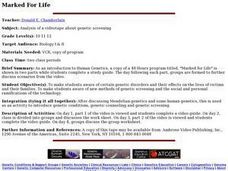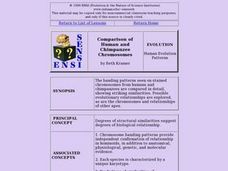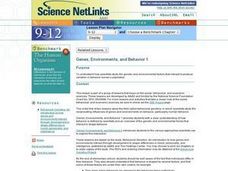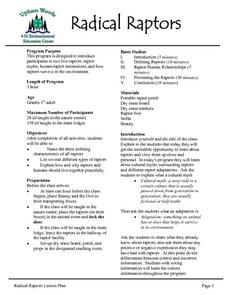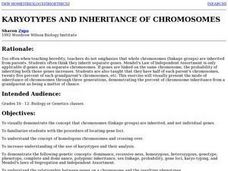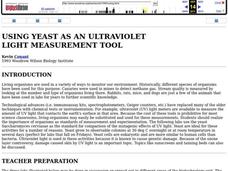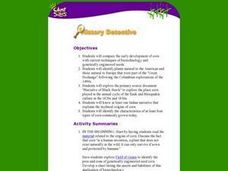Curated OER
Bioethics: Debates in the Science Classroom
Learners defend one side of a genetics ethics argument. They pull together a portfolio of human genetics and decision making skills. Students are allowed to prove what he/she has learned and express a personal opinion. They also are...
Curated OER
Marked For Life
Students study certain genetic disorders and their effects on the lives of victims and their families. They investigate new methods of genetic screening and the social and personal ramifications of the technology.
Curated OER
Comparison of Human and Chimpanzee Chromosomes
Young scholars actively engage in the careful analysis of chromosome banding patterns and identify examples of inversion in homologous chromosomes.
Curated OER
Genes, Environments, and Behavior 1
Students examine how scientists study the genetic and environmental factors that interact to produce variation in behavior across a population.
Curated OER
Sociobiology: Heredity Factors
Students examine DNA replication and how proteins are synthesized from DNA codes and continue to explore the effects of genetics in additional lessons. Among the topics covered are: protein synthesis, cell chemistry, environmental...
Curated OER
Health and Food Safety
Learners discuss ways to keep healthy, and examine factors that influence health, including media. They then participate in mock public meeting on genetically modified foods in order to explore importance of governmental decisions in...
Curated OER
Wilderness
Students examine the dynamic between animals and humans in the wilderness. They work together in groups share their journal entries when asked to reflect on natural areas.
Curated OER
The Effects of Ultra-Violet Light on Yeast
Pupils work in small groups collecting and analyzing data as they learn how to best grow yeast. This lesson allows students to conduct several student-created experiments as they continually generate questions and hypotheses. ...
Curated OER
Cell Structure and DNA
Sixth graders identify, locate and describe the function of the parts of a cell. In groups, they state the five stages of mitosis and put them in the correct order. They are introduced to the structure of DNA and mRNA and how they...
Curated OER
Genes, Environments, and Behavior 2
Students explore how scientists study the genetic and environmental factors that interact to produce variation in behavior across a population.
Curated OER
Radical Raptors
Students are introduced to raptors and their role in the environment. They identify three characteristics of raptors and list several types of raptors found in nature. They discuss their positive and negative experiences with raptors and...
Curated OER
Karyotypes and Inheritance of Chromosomes
Students explore the mode of inheritance of chromosomes. Given a scenario, students use the Human Genome sheet to determine inherited chromosomes. They illustrate the difference between genotype and phenotype. Students develop a model...
Curated OER
Using Yeast as an Ultraviolet Light Measurement Tool
High schoolers accurately measure the relationship between radiation dose and either survival or some genetic event such as mutation or recombination. They investigate the damage that was done to the DNA molecule as a result of exposure...
Curated OER
Biodiversity Activity
Students are introduced to biodiversiy. They use a simulation of two forests, one planted with only Douglas Fir trees, and one with diverse species of trees. Students also use the simulation of two forests, one a monoculture of only one...
Curated OER
Managing Wildlife
Students discuss the current conditions of wildlife in New England. Students explore how animals are tracked and how their population is managed.
Curated OER
Genome: The Secret of How Life Works
What do you have in common with a fruit fly? About 60 percent of your DNA. The resource, divided into two units, is intended for grades four to eight and another for high schoolers. Both units include eight lessons covering the...
Curated OER
Spring
Students examine lichens in an outside field trip. Students explore the diversity of this organism and ask questions about them.
Curated OER
Bioethics
Students are introduced to the issues surrounding bioethics and begin to discover how some of these values can influence decision making. The exciting part of this lesson is the constructivist method used to engage students of all...
Curated OER
History Detective
Middle schoolers study the effects of the Great Exchange on the Americas.
Curated OER
How Do Organisms Reproduce
Students examine the difference between mitosis and meiosis, and describe the steps involved in meiosis and the significance of each step. They create a diploid nucleus containing two pairs of chromosomes using clay.
Curated OER
It's Alive! Using Microorganisms in Cooking
Learners create a KWL chart about food. In this chemistry instructional activity, students differentiate physical and chemical changes. They explain how microorganisms are used in food preparation.
Curated OER
Molecular Approaches to Evolution
Students examine the molecular studies of organisms that have led to a new era in their understanding of speciation and evolutionary relationships. Students study the allelic frequency of genes controlling specific molecules and assess...
Curated OER
Plant Structure and Growth
This plant structure and function PowerPoint addresses the main organs and the factors that affect its development as well as going into detail about the specializations at a cellular level. The cell functions and system...




